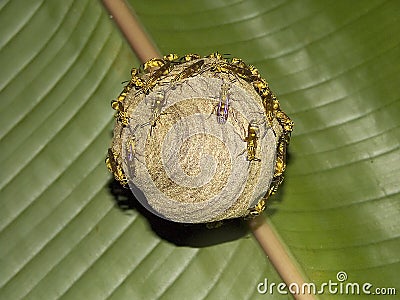Hi there all, has anyone out there in Ex pat land had any dealings with African killer bees
I have a nest, in my garden that ive been told is a nest of African killer bees
I know, they wont there yesterday, but I noticed they is a nest on a tree, today
the local council, Iguaba Grande don't want anything to do with them
Iam lucky, because the nest is close to the ground, so I might petrol bomb them in the night
please let me know
cheers Peter
African killer bees
The chance of the nest being African killer bees is very remote. They are really nowhere near as common here as urban legend makes them out to be, and in most cases when they're discovered they've invaded a commercial beehive, expelled all of the more docile domestic bees and simply taken over. When they do actually build their hive in a tree it is enormous and recognizable instantly because unlike the wasps/hornets who dwell inside their nests, African Killer Bees tend to swarm all over the outside surface of their hive.
What you probably have in the tree would be a Mud Wasp/Paper Wasp nest (also known as Hornets).... here known as Marimbondos or Vespas. If it is a grayish brown ball or egg shaped or hemispherical nest open at the bottom showing the cells, that appears to be made of paper, then thats what you've got.
These wasps are extremely aggressive especially if disturbed in any way. They have a keen sense of movement and just passing near the nest may be enough to provoke an attack. If you want to get rid of them it's best to call the municipality or the Fire Department to take care of the task.
Cheers,
James Expat-blog Experts Team
Hi James
What I have is exactly what you have in the first picture
what ever, they are, I don't really know, some of the local people here, say there killer bees
all the bees are huddle up together, and lucky its cold here at the moment
I will take a photo of the bees tomorrow, if there still there
I would of destroyed what ever they are tonight, but its raining here and to windy
so maybe tomorrow night
I have dogs that are lose around my large garden and I don't want dead dogs, and I don't mind dead bees
or want someone to come and get them
if not, they must go, and the only way I know is to burn them very quickly
and I know some very good tricks with petrol
peter
Hello!
The bees are best treated with smoke, which disorients them. Try to contact a bee keeper who has the correct clothes and equipment. I would not recommend anything else, other than being sure they are asleep, climbing up and butting a heavy bag around them, capturing the entire group.
If they are the African Killer Bees, they are very similar to the European Killer Bees that are in North America, just a little more aggressive. Still, best to have a bee keeper with experience handling this.
Good luck! Douglas
Hi Douglas
know body around here wants anything to do with them
and I am not going to take a chance with trying to move them
so for me the best thing I can do is to destroy them quickly and humanely
I don't really want to, but iam not going to take a chance
we rung around some of the bee keepers and as ive said they don't really want to know
you can have them if you want
many thanks and cheers
Peter
Hi and good morning James
it seams I cant send you a photo of the bees this way,
I will have to try a different way
To post photos on Expat-blog you first need a photo sharing site account, like Photobucket, Flickr, etc. You upload your photos to the account and then you open the photo library, copy the image URL and then you can paste it into the field that appears in the drop-down window here when you click on the photo link icon above the reply box. Then in the position box type in l for left, r for right, or c for center whichever suits you. You can also do the same for photos from any webpage, if you find something on Google Images, you have to go to the webpage and not just try and copy the URL from the Google Images thumbnail photos.
Cheers,
James
Hi James
Someone has been around to look at the bees
he say's there not the African bees, theses one are different, and he also said they were just traveling, and would be gone soon
so let's hope he's right,
anyway thanks for your help
Peter
Hi Pete,
That could well be true, bees "swarm" (i.e. the entire colony including the queen simply abandon the hive to seek a new hive) for various reasons such as, lack of food, excessive heat, frequent disturbances, etc.
Also the may be "absconding" (i.e. when 70 -80% of the workers and the queen abandon a hive and establish a new colony), essentially splitting the colony in two and a new "virgin queen" develops to head the old colony.
These processes may happen one or more times in a season.
Cheers,
James
If they aren't African bees then if possible you should leave them alone.Bees are very very important to the world and are disappearing at an alarming rates.Good luck.
Hi RC206
A Brazilian Bee keeper came around to see the nest,, He said they were the Africanised killer bees, and were very dangerous and to keep well away, Keeping well away was a problem for me, because the nest was low to the ground and next to the house, and also I have "3" 2 year old nosey dogs
The bee keeper did say, it was a very small nest, and the would probably move on, and 2 days later it did
I know bees are important to the world, but not in my garden they not, they can fly in and fly out, do the business, and live somewhere else,
Anyway ive now notice that very concrete telegraph poll in my area, seams to have bees or wasps nest in them, some Brazilian in his designed the polls with a hole in it, that just right any insects to make its home
But is saying that Ive just been offed a job going a round Iguaba Grande replacing the light and light bulbs for the town, this will involves climbing up the polls where the wasps/ bees are, it seems a cant get away from the things,
maybe do the work of a night time, when there asleep









